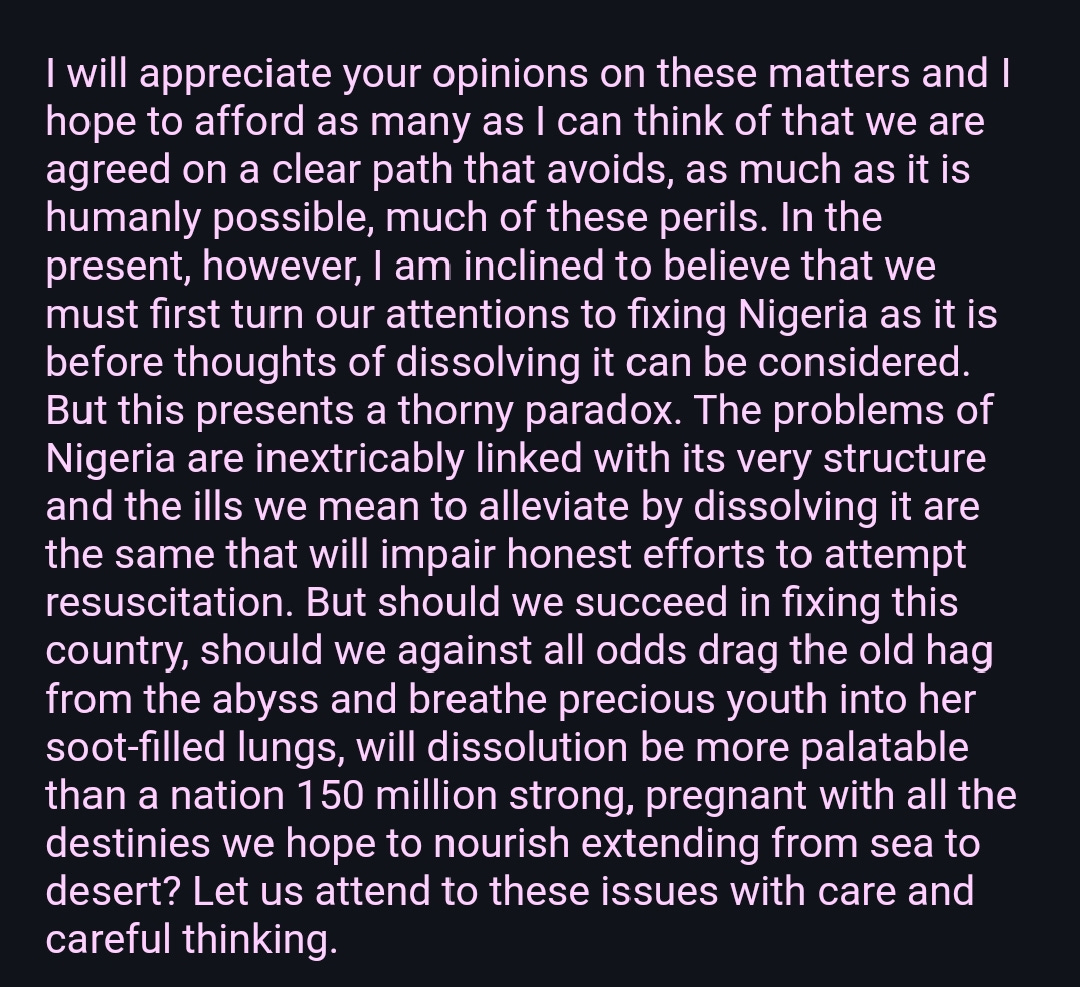This was a conversation I had with a friend. I thought it would be interesting to turn it into a blog post while improving some of his arguments and fleshing out a lot of mine (on second thought, I won't do that anymore since it won't be fair to him).
But first, a brief outline of the circumstances of our discussion should suffice:
As should be immediately obvious, I am a Nationalist. I have a full affinity with the Hamilton-List Political Economy so I think Nationalism is important for civilisation building. In addition to that, I have also come to believe a lot of facts as irrefutable. One is that national IQs, despite the criticism laid against them, do well in predicting much of what should concern us (life expectancy, economic progress, achievement, etc.) and I find the insinuation that Nigeria has a low national IQ to be veritable. While I have yet to read Lynn's Bell Curve, I have read his other papers and am convinced also that (a) intelligence is heritable (b) IQ tests are useful in predicting what intelligence is capable of even when we allow that it's not a perfect metric and doesn't measure intelligence directly (c) the black-white IQ gap holds, is tenable and is explainable by biological factors.
These are, I hope, all of my "biases." My conversation with my friend should make sense in consideration of all of the above.
It is probably best if this section should be returned to after you must have read the rest of this post. Nevertheless, it needs stating. What is the problem of Nigeria? "Skill issue" sounds like a haughty answer, but it at least admits of some truth. The country is close to 200 million strong, divided along regional, religious, and ethnic lines, and depends solely on oil exports with the added vulnerability that slight fluctuations in oil prices cause exaggerated effects on its economy. For much of its history, it has lived under military rule. It was under such one that it first discovered oil.
Max Siollun reports that this increased the revenue of the country by about 500%. For a country so young, this was considerable wealth. The story that immediately follows is just as heartbreaking as it is infuriating. Through corruption and incompetence, much of it was squandered. Presently, we live in a time where the government continues to borrow to service recurrent expenses, digging itself deeper into debt. Proliferate borrowing is a staple of the times, with states borrowing over and above their internally generated revenue.
How could such a "fortunate" country have come to such a fate? Answers abound, many insisting that the problem of Nigeria is its leaders. This has borne out to be true, but considering that the West has endured even more extreme levels of corruption and has as yet continued to remain the envy of every nation that looks to her, that argument falls flat.
A second objection could insist that we do not have a lot of natural resources. But from what I have mentioned about the discovery of oil, it seems to me that this does not stand serious scrutiny. Before oil, the country was engaged in other exports, and the discovery of oil caused them to be abandoned. There exist presently a few avenues that remain to be utilized, but they have either been utilized poorly or left to languish (although they do provide employment for vandals and smugglers).
My thesis is different. In line with Lynn's IQ and The Wealth of Nations, I will argue instead that Nigeria's — indeed Africa's — problem can be reduced to having a *low average intelligence.* This explains the incompetence of our governments and the incompetence of the citizens. It explains the high crime rate, hardly palatable for foreign investors, and also the lack of innovation in several sectors important to the growth of a national economy (I mean, of course, the hard sciences, where no Nigerian has won acclaim).
Furthermore, I do not agree that education is the whole problem. While it is true that a good number of the population remains uneducated, when we limit our considerations to government officials and university graduates, the issue disappears. There is also much to be said for the argument that those gains are spurious and do not represent an actual increase in intelligence. Education is discovered not to be the panacea we are looking for.
What remains, then, is a nationwide effort to improve our natural intelligence with eugenics. I intend to expound on this in another post so I will leave my thoughts for when I do that. However, I believe that such a policy, in addition to others that attempt economic resuscitation and improve access to education, will do much to rescue the nation from the fates it tends to with its declining national IQ.
This brings us to the contention that is migration. In the conversation I present shortly, I do well to separate the immediate interest from a consideration of its social consideration from the perspective of the source region. Since it was a chat I had, I am [painfully] aware that my arguments have more emotional appeal than sound reasoning. Nationalism, as I argue, is an emotional thing, so I will forgive myself for not being composed of bolts and screws.
Nevertheless, the arguments I make _are_ sound, even if less so in comparison to a more definitive exposition on the matter.
Armed with foreknowledge of my blind spots and deductions, let us now tend to the matter at hand.
Nationalism and Migration
ALEX: In the matter of self-interest, how far or how near are you looking? Because in the previous slide, you pointed to the fact that one would want the best for themselves and no matter the definition of best, a foreign, more developed country is almost infinitely better than a useless motherland.
ALEX: Also, setting roots in such a vapid land suggests that there would have to be children. And then, There's a dilemma: do I give birth in a country that is better for me and said children, at the cost of uncertainty, or do I birth children In a desolate place that gives them almost no benefits aside from the fact that it is their country?
ANINI: None of what I'll say applies to you if you are A) not looking to have children and B) do not care about the fates of such children.
ANINI: The distance I am alluding to is a few generations, as low as one and as high as three. These events will happen in real-time as you have grandchildren.
ANINI: To correct your insinuation that a foreign, more developed country is best, we should qualify for whom this country is best. Take the West or any other meritocratic society. Said country is a boon for anyone with above-average intelligence, a history of affluence, citizenship, and moderate wealth to acquire a premium education.
ANINI: Now as a migrant, how many of these advantages will you have? Let's assume that all but citizenship is present. Since we marry according to self-selection, you will be in the position to marry an affluent partner (say, a moderate annual income above 100k). This will guarantee survival and a medium level of comfort. Additionally, your children will enjoy these immediate benefits, but it will not extend beyond them. Assuming regression, your children become less smart than you. This means they will struggle in the job you may have done, will have their opportunities diminished, and while having access to a college education, will not be able to arrest all its advantages as you have. They will be reduced to a lower standing than you. And this will worsen when they have children. Why? Again, self-selection. You met your spouse in your circle. They will find theirs in a lower circle and will marry persons just as intelligent as them.
ANINI: And the situation of their children will be progressively worse. By the third generation, all such benefits will have become illusory, with your grandchildren being less or only averagely intelligent, earning a poor income, working a poor job, and marrying persons like them.
ANINI: How soon until criminalities, which correspond with declining intelligence, begin to occur?
ANINI: How soon until these criminalities begin to irritate the descendants of your host? How soon until they begin to contemplate their expulsion?
ANINI: Before all these happen, the said generation in question will resemble in every manner, not you, but the natives of the country you left behind. Before all these will happen, the said generation in question will resemble in every manner, not you, but the natives of the country you left behind. The only "benefit" they will have is that they live in a different country. But in this country, they will be in prisons, depend on social aid, and will be killed by their environment, which they also self-select, and a host of other conditions.
ANINI: And EXPULSION has not left the table.
ANINI: Considering the superhuman capability of the West, such massive expulsion is not just possible, but wholly feasible. In the event that White Nationalism makes a comeback, in the event that that faction prevails over the other and convinces them that invaders and aliens are the cause of their worry, your children will immediately feel the brunt of such a measure. Worse, they will be INCAPABLE of fighting it. They will have to negotiate with other factions that are opponents to their hosts for their well-being. You will, in short, condemn them to servitude, to a mediocre and repugnant life.
***
ALEX: Also, setting roots in such a vapid land suggests that there would have to be children. And then, There's a dilemma: do I give birth in a country that is better for me and said children, at the cost of uncertainty, or do I birth children In a desolate place that gives them almost no benefits aside from the fact that it is their country? [This argument repeated for emphasis]
ANINI: I believe this has been answered. That in the two scenarios, the only difference is the good you and your immediate children will enjoy. That proceeding generations will be worse off or at least equal to the generations in the latter, with the added weakness of being UNABLE to do anything about it other than complain.
***
ALEX: Do we not also have the issue of "chasing back the invaders" here in Nigeria? How that people want everybody to go back to their home states, irrespective of language barriers, culture barriers and even environmental barriers?
ALEX: How that the seventh generation has gone so far from the original culture and behaviors of people that speak the same language and that upon being forced to go back, the differences would be clear and then, they too might be regarded as "invaders." What then?
ANINI: On to this. To answer this objection, we should consider who in the two will be more likely to succeed in their aim, and who, in the two, will be more capable of violent evil and dangerous injury. On speculation, it is immediately concluded that the West, being more skilled in organized gangsterism, being more powerful in human capital and possessing even more powerful means to injure, is the greater danger. States in Nigeria are bonded, if not in national spirit, then by territoriality. In addition to being impotent themselves, they will have to be profoundly insensible to offend all their neighbors who must perpetually remain in their backyard. This instinct will mitigate and diminish any such desires to expel "invaders" since our destinies are inextricably linked.
***
ANINI: Now, you make a profound failure in your description of nationalism. What you describe is not Nationalism, but mere material dependence. What good is the latter in times of war, in times of economic collapse, in times of all those evils that regularly and perpetually afflict Nations? Should the French be French only when France is bedecked in gold and silver? Should the American only be proud of his heritage when the coffers of his state overflow with the wealth of distant nations? And if he will prove himself to be so chimerical in his loyalty, so fickle in his devotion, can any State, including the one he runs to, cohabit with him in good faith?
ANINI: This is COMPLETELY IMPOSSIBLE.
ANINI: Nationalism then, loyalty to a superpersonal identity, must supersede material dependence and must include moral, intellectual, and religious devotion for it to be worth anything.
ALEX: That was not the point. The point is that there is almost no point in being Nigerian. We inherit some of the worst IQs and emotional and general usefulness quotients. We pursue, glorify, and install terrible societal hierarchies and utilities. It is not about being bedecked by silver and bronze. Do you get what I'm saying? I still haven't learned enough in geopolitics and all to use the words properly like you do.
ALEX: It doesn't make me less of a person, morally or otherwise to want to abandon a project I do not see any hope in. Investors do it, every day. We do it in our online game, too. Especially in MMORPG, where you can vote to surrender since the gold, equipment, and power difference is too great to stake hope on. Abandoning the Nigerian dream also doesn't make me superior. Morally, intellectually or otherwise. That almost defeats the purpose. I am looking for a home. For a place, I can feel the most natural and a place that is involved in its process and its citizens. It kinda sucks that you can't just decide to move states. To just become a citizen of Canada today. Or to go to France and call yourself French.
ALEX: The Nigerian dream is not something I resonate with. Just like Jesus is NOT my Lord and personal savior.
ANINI: I have not said it does [make you a bad person]. You seem to think that Nationalism makes no sense and that it is in our immediate interests to abandon said identities in pursuit of others, as many times as that is to be expedient. But your thinking is narrow. It will be just as impossible to do that as it will be for others to accept you.
ANINI: This [To just become a citizen of Canada today. Or to go to France and call yourself French] is the entire point. The whole thesis. If I could, I would immediately become an American. I will be a better American than MOST Americans. I share a greater affinity with their culture, am fascinated by their Founding Fathers with Hamilton being the gem of my heart, and I am more concerned about their continued existence than most of them are. But this is IMPOSSIBLE. As such, in the long run, it is also injurious to my existence. Try as I might, my fate is linked to where I was born for the foreseeable future. If this is true for both of us, which again is better for our interests — abandonment or aiming to fix? It should be conceded that the former will not work and that the latter is the more secure avenue.
ALEX: Nigeria working again is a pipeline dream. But if it does, fuck. I'd be so happy. I'd. . . Still go to France.
(I laughed so fucking hard, lmao).
It is education that must give souls a national formation, and direct their opinions and tastes in such a way that they will be patriotic by inclination, by passion, by necessity. When first he opens his eyes, an infant ought to see the fatherland, and up to the day of his death he ought never to see anything else. Every true republican has drunk in love of country, that is to say love of law and liberty, along with his mother's milk. This love is his whole existence; he sees nothing but the fatherland, he lives for it alone; when he is solitary, he is nothing; when he has ceased to have a fatherland, he no longer exists; and if he is not dead, he is worse than dead.
- Jean-Jacques Rousseau









Someone posted a picture of white child labourers and the caption was aimed at debasing the controversy around "White privilege".
It could be interpreted as: If this was white kids from just a hundred years ago, then where is the white privilege you lots are talking about?"
And I actually agree.
"White privilege" only exists because White people advanced their societies so much in the last few centuries.
And that privilege is what the migrants seek when they migrate.
And who are the ones to migrate? Those capable of acquiring visas or those brave enough for the coarse sahara sands and the Mediterranean sea.
As bad as the country is getting I don't see myself moving away, I do want to travel out of this country but I also want to go to five, ten, twenty other countries and at the end I want to come home, to be able to gather experience but still come back home, I don't want to be permanently anywhere.
And it's high time we realized our leaders don't carry the fault alone, the citizens have their own share of the problem, I see what we do to ourselves but the government is always to blame, we are part of the government.